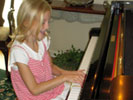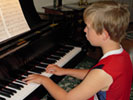Q: How much do you charge for lessons?A: $28 per half hour, or $42 for 45 minutes. I want music to be accessible as possible so this rate is just below the Naperville average half hour rate.
Q: How long does my child have to practice?
 A: That will vary depending on the age and ability of the student. However, a new learner should commit to practicing 30 minutes 5 to 6 days per week.
If your child has trouble staying at the piano for the set amount of time you’ve determined for him, consider breaking up the allotted time into two segments throughout the day; morning and evening, after school and after supper, etc. Do what works for your child. Enable him to become the best he can with the right practice routine for him.
A: That will vary depending on the age and ability of the student. However, a new learner should commit to practicing 30 minutes 5 to 6 days per week.
If your child has trouble staying at the piano for the set amount of time you’ve determined for him, consider breaking up the allotted time into two segments throughout the day; morning and evening, after school and after supper, etc. Do what works for your child. Enable him to become the best he can with the right practice routine for him.
Q: What do you require of parents? A: That’s an excellent question. Parents are always welcome to attend the lesson, but attendance is not required. I strongly encourage parents to listen to the lesson your child is preparing at least once during the week; and if possible, at the beginning and the end of the week is optimum. If your child has a listening ear, he will be more motivated to perform for you, his greatest cheerleader! I also encourage you to regularly have your piano tuned. An instrument that is in tune will provide more motivation for practicing than one out of tune.
Q: Do I need a piano in order to take piano lessons? A: No. While a piano is the instrument of preference, students have had success learning to play on a keyboard. If you have a keyboard or are planning to purchase or rent one, consider the following: The keyboard should have “piano touch” (Piano jargon: weighted hammer action). Consider a keyboard with 88 keys if possible (piano jargon: a full size keyboard) and it should include a pedal. You’ll need a music stand and good light.
If you have no instrument to practice on, consider renting one with the option of purchasing it. I can make recommendations, just ask. I have had students make an arrangement with someone to use their piano or keyboard until they can obtain one of your own. Remember – you’ll need to practice regularly in order to progress.
 Q: What is the "right" age to begin piano lessons?
A: Any one, at any age can begin to learn to play the piano. An ideal time is age 7. Learn more about the right time to begin by reading my post, "Is my child ready?"
Q: What is the "right" age to begin piano lessons?
A: Any one, at any age can begin to learn to play the piano. An ideal time is age 7. Learn more about the right time to begin by reading my post, "Is my child ready?"
Q: Will you travel to my home for lessons? A: At this time I only offer lessons in my studio at my home in North Naperville. This enables me to charge less and teach more.
Q: What method do you use in teaching? A: My method is the traditional approach. While there are many method series available today, and I favor some above others, I try to individualize music methods to the student's abilities.
Q: How does billing work? A: An invoice is emailed monthly in advance, which can be paid online. Included in the invoice is any music and/or supplies that I have purchased for your child. If you are interested in purchasing your own music and supplies kindly inform me.
Q: What is your policy regarding skipped lessons? A: During the school year, no lessons will be rescheduled for any reasons other than illness or family emergency. In such cases, it is the student’s responsibility to contact the piano instructor to make up the lesson within one week. In the event a lesson is not made up, it will still be charged to the student.
Q: Do you have recitals? A: I have a spring piano recital. The students also perform several times during the year in their performances classes. I want my students to enjoy music and enjoy performing music for others. See next question.
Q: My child wants to take piano lessons, but doesn’t want to play in the recital. Is he required to? A: No. While I strongly encourage participation in recitals for developing poise and self-confidence, performing in a recital is not a requirement for taking piano lessons.
Q: Do you teach adult students? A: Yes. I enjoy teaching adult learners. If as an adult you’re considering studying piano I suggest you consider two things: Commit to practicing, and schedule a regular practice time for yourself daily, and be patient with yourself. On one hand, your grasp of musical concepts will come quite quickly; on the other hand, regular practice is a must if you hope to achieve your goal of playing the piano well. We’ll discuss and routinely reevaluate your musical goals and musical preferences, and enjoy the reality of achieving them together.
Is your question not here? Email me or contact me by phone. I would be happy to answer your questions.